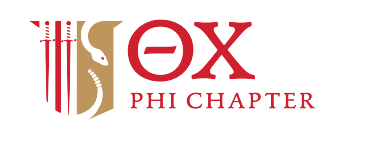Written by Frank H. Schrenk, Kappa/Pennsylvania ’15, the Creed has become an important part of our traditions and an expressive means of stating our ideals and objectives as a fraternity.
About the Author

Frank H. Schrenk, the author of The Creed of Theta Chi, was born on November 29, 1886. He entered the University of Pennsylvania in Philadelphia in 1906, and completed his undergraduate studies in just three years, graduating in 1909 with a Bachelor of Science degree in Economics. After working in business for two years, he was admitted into graduate school in 1911 at Penn and received a Masters degree in 1912. During that time, he served as an instructor in the famed Wharton School of Finance at Penn. Following graduate school, Brother Schrenk applied to the University of Pennsylvania Law School, and began classes in the autumn of 1912.
Frank Schrenk was an accomplished athlete. In 1910, he became an amateur welterweight boxing champion in Pennsylvania. While in law school, he was a member of the varsity football team, and captained the water polo team. In later years, he became an outstanding bowler, participating twice in national tournaments sponsored by the American Bowling Congress, and he was elected president of the Philadelphia City Association of the ABC and served as city bowling chairman.
Brother Schrenk became interested in joining Theta Chi Fraternity at the University of Pennsylvania in the fall of 1913. He joined Kappa Chapter on April 21, 1914, and was initiated on April 28, 1914. The practice of pledging, as we know it today, was not as common in those days, and men were often initiated within days of being asked to join a chapter. He quickly earned a reputation as a hard-working, dedicated, unselfish and courageous brother who spent much of his time assisting others.
Frank Schrenk received his law degree in June of 1915. He was elected to the Grand Chapter in 1919, serving as National Chaplain for the first year and as National Vice President from 1920 to 1926. In 1926, he was elected National President, and served in that capacity until 1929, when he was required to step down from the presidency by our By-Laws. He remained on the Grand Chapter as National Chaplain until his death.
In addition to his law practice, Frank Schrenk was involved in numerous business activities. He helped to organize the North City Trust Company in Philadelphia in 1927, which proved to be an immediate success. However, the great stock market crash of 1929 brought tremendous problems to the company. Brother Schrenk chaired a conference of the presidents of closed and restricted banks, and was elected chairman of the National Depositors Committee, which represented those banks and financial institutions which were affected by the federal Reconstruction Finance Corporation. He was determined to battle the R.F.C. and force the release of prime assets to affected banks.
When the North City Trust Company reopened on a restricted basis in March of 1933, Frank Schrenk devoted much of his time to assisting other closed and restricted banks across the country through the National Depositors Committee. The strain of that work, for which he received little monetary compensation, along with the pressures generated from his own company, became too much to bear. On September 30th, 1933, Frank Schrenk took his own life.
At a memorial service held on October 2, 1993, he was remembered for his humanity, energy, leadership and example of the Helping Hand to Theta Chi and to many others. Brother Schrenk was the force behind the establishment of the National Endowment Fund, which led to the formation of the National Board of Trustees in 1927. The first Executive Office of our Fraternity was established during his service as National President. He was described as a “perfect typification of courageous manhood and fine friendship” by one of our national officers.
Brother Schrenk shared his talents in numerous philanthropic projects. When a hearing defect prevented him from serving in the Armed Forces during World War I, he became a volunteer worker for the American Red Cross, organizing counties and making as many as thirteen speeches a day. He participated in the Liberty Loan Campaign and toured Pennsylvania on the Victory Loan train in 1919.
In 1946, legislation was adopted that required an engraved copy of The Creed of Theta Chi to be hung in every chapter house. The Creed is a clear and concise expression of the ideals and objectives of Theta Chi Fraternity. Many thousands of our members have discussed, debated and learned the words of The Creed, and it stands as an expression of the idealism which Brother Schrenk often referred to in his reports to the Convention while National President. Truly, The Creed of Theta Chi reflects the brother who authored it and who gave so much of himself in his pursuit of the ideals, concepts and values contained in seventeen lines and four phrases.

